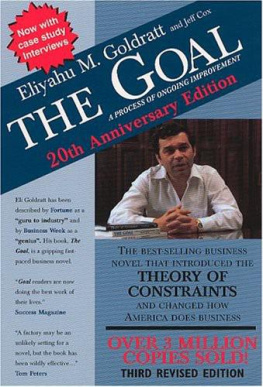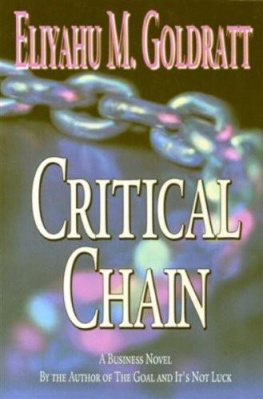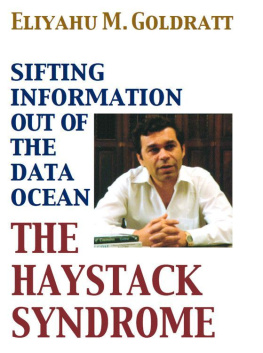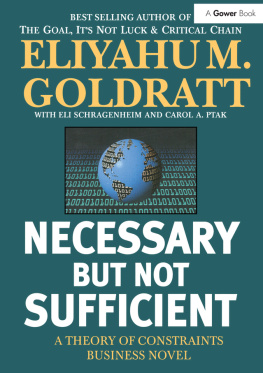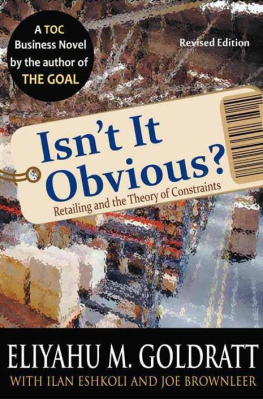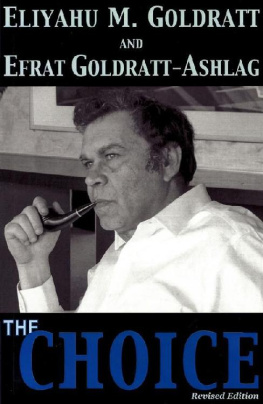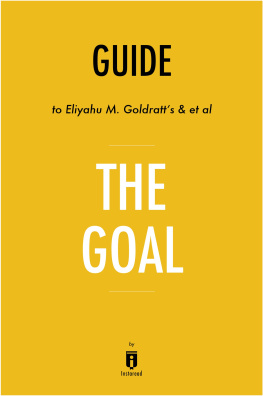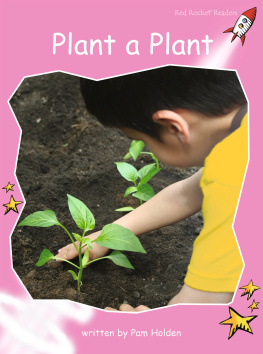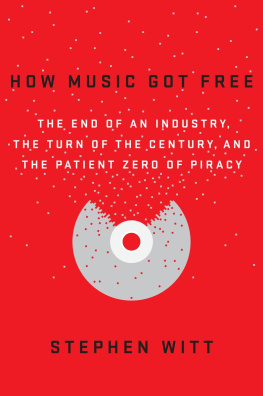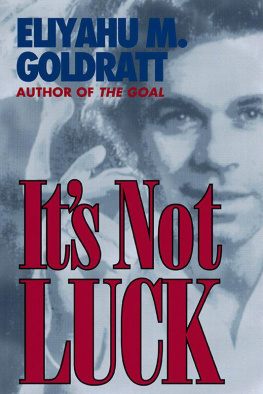Other North River Press Books by
Eliyahu M. Goldratt
The Race (with Robert E. Fox)
Theory of Constraints
The Haystack Syndrome
Its Not Luck
Critical Chain
Necessary But Not Sufficient
Production the TOC Way
Essays on the Theory of Constraints
Late Night Discussions
Additional copies can be obtained from your
local bookstore or the publisher:
The North River Press
Publishing Corporation
P.O. Box 567
Great Barrington, MA 01230
(800) 486-2665 or (413) 528-0034
www.northriverpress.com
First Edition Copyright 1984 Eliyahu M. Goldratt Revised Edition Copyright 1986 Eliyahu M. Goldratt Second revised Edition 1992 Eliyahu M. Goldratt Third Revised Edition 2004 Eliyahu M. Goldratt
All rights reserved. No part of this book may be reproduced or utilized in any form or by any means, electronic or mechanical, including photocopying, recording, or any information storage retrieval system, without permission in writing from the publisher
Manufactured in the United States of America
Library of Congress Cataloging-in-Publication Data
Goldratt, Eliyahu M., 1948
The goal: a process of ongoing improvement
I. Cox, Jeff, 1951-. II. Title
PR9510.9.G64G61986 823 86-12566
ISBN: 0-88427-178-1
INTRODUCTION
The Goal is about science and education. I believe that these two words have been abused to the extent that their original meanings have been lost in a fog of too much respect and mystery. Science for me, and for the vast majority of respectable scientists, is not about the secrets of nature or even about truths. Science is simply the method we use to try and postulate a minimum set of assumptions that can explain, through a straightforward logical derivation, the existence of many phenomena of nature.
The Law of Conservation of Energy of physics is not truth. It is just an assumption that is valid in explaining a tremendous amount of natural phenomena. Such an assumption can never be proven since even an infinite number of phenomena that can be explained by it does not prove its universal application. On the other hand, it can be disproved by just a single phenomenon that cannot be explained by the assumption. This disproving does not detract from the validity of the assumption. It just highlights the need or even the existence of another assumption that is more valid. This is the case with the assumption of the conservation of energy which was replaced by Einsteins more globalmore valid postulation of the conservation of energy and mass. Einsteins assumption is not true to the same extent that the previous one was not "true.
Somehow we have restricted the connotation of science to a very selective, limited assemblage of natural phenomena. We refer to science when we deal with physics, chemistry or biology. We should also realize that there are many more phenomena of nature that do not fall into these categories, for instance those phenomena we see in organizations, particularly those in industrial organizations. If these phenomena are not phenomena of nature, what are they? Do we want to place what we see in organizations to the arena of fiction rather than into reality?
This book is an attempt to show that we can postulate a very small number of assumptions and utilize them to explain a very large spectrum of industrial phenomena. You the reader can judge whether or not the logic of the books derivation from its assumptions to the phenomena we see daily in our plants is so flawless that you call it common sense. Incidentally, common sense is not so common and is the highest praise we give to a chain of logical conclusions. If you do, you basically have taken science from the ivory tower of academia and put it where it belongs, within the reach of every one of us and made it applicable to what we see around us.
What I have attempted to show with this book is that no exceptional brain power is needed to construct a new science or to expand on an existing one. What is needed is just the courage to face inconsistencies and to avoid running away from them just because "thats the way it was always done. I dared to interweave into the book a family life struggle, which I assume is quite familiar to any manager who is to some extent obsessed with his work. This was not done just to make the book more popular, but to highlight the fact that we tend to disqualify many phenomena of nature as irrelevent as far as science is concerned.
I have also attempted to show in the book the meaning of education. I sincerely believe that the only way we can learn is through our deductive process. Presenting us with final conclusions is not a way that we learn. At best it is a way that we are trained. Thats why I tried to deliver the message contained in the book in the Socratic way. Jonah, in spite of his knowledge of the solutions, provoked Alex to derive them by supplying the question marks instead of the exclamation marks. I believe that because of this method, you the reader will deduce the answers well before Alex Rogo succeeds in doing so. If you find the book entertaining maybe you will agree with me that this is the way to educate, this is the way we should attempt to write our textbooks. Our textbooks should not present us with a series of end results but rather a plot that enables the reader to go through the deduction process himself. If I succeed by this book to change somewhat your perception of science and education, this is my true reward.
INTRODUCTION TO
THE FIRST EDITION
"The Goal is about New global principles of manufacturing. Its about people trying to understand what makes their world tick so that they can make it better. As they think logically and consistently about their problems they are able to determine "cause and effect relationships between their actions and the results. In the process they deduce some basic principles which they use to save their plant and make it successful.
I view science as nothing more than an understanding of the way the world is and why it is that way. At any given time our scientific knowledge is simply the current state of the art of our understanding. I do not believe in absolute truths. I fear such beliefs because they block the search for better understanding. Whenever we think we have final answers progress, science, and better understanding ceases. Understanding of our world is not something to be pursued for its own sake, however. Knowledge should be pursued, I believe, to make our world betterto make life more fulfilling.
There are several reasons I chose a novel to explain my understanding of manufacturinghow it works (reality) and why it works that way. First, I want to make these principles more understandable and show how they can bring order to the chaos that so often exists in our plants. Second, I wanted to illustrate the power of this understanding and the benefits it can bring. The results achieved are not fantasy; they have been, and are being, achieved in real plants. The western world does not have to become a second or third rate manufacturing power. If we just understand and apply the correct principles, we can compete with anyone. I also hope that readers would see the validity and value of these principles in other organizations such as banks, hospitals, insurance companies and our families. Maybe the same potential for growth and improvement exists in all organizations.

